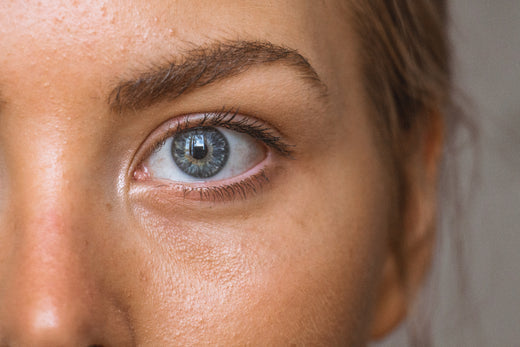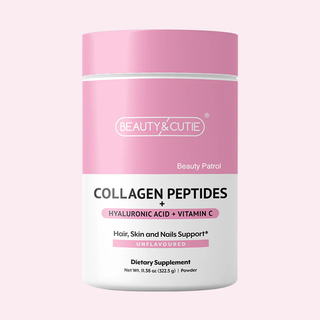Are you currently facing an abrupt emergence of skin concerns, questioning, "What's causing my sudden skin issues?" You're in good company. Numerous women in their twenties and thirties encounter unforeseen skin troubles that can prove vexing and perplexing. We'll examine five common causes for the rapid worsening of your skin's state here. Ranging from hormonal shifts to lifestyle influences, comprehending these factors can empower you to reclaim mastery over your skin's well-being. As a result, let's go below the surface and find answers to your pressing questions.
Why Is My Skin So Bad All Of a Sudden?
- Hormonal Changes:
Hormonal fluctuations can wreak havoc on your skin. Hormonal imbalances are a common occurrence for numerous women during their menstrual cycles, pregnancy, or perimenopause. These fluctuations in hormones often result in elevated oil production, clogged pores, and the onset of breakouts. If you notice that your skin tends to act up during certain times of the month or during these life stages, hormonal changes may be the culprit.
- Stress:
Stress is another major factor that can contribute to sudden skin issues. When you're stressed, your body reaction releases cortisol, a hormone that can stimulate oil production and inflammation. This may result in facial breakouts, redness, or even flare-ups of psoriasis or eczema. Implementing appropriate stress management strategies, such as exercise, meditation, or counseling, can make a significant difference in your skin's health.
- Diet:
Your skin can be significantly affected by what you eat. Pimples, inflammation, and outbreaks can result from eating a diet high in sugar, processed foods, and bad fats. On the other side, clear and healthy skin can be supported by a diet high in fruits, vegetables, lean proteins, and healthy fats. Make sure you're getting the nutrients your skin needs to thrive by paying attention to your food.
- Skincare Routine:
Your skincare routine plays a crucial role in the health of your skin. Using the wrong products or neglecting proper skincare can lead to sudden skin issues. Make sure you're using gentle, noncomedogenic products that are suitable for your skin type. Don't forget to wash, moisturize, and sunblock your skin as well. Establishing and maintaining a regular skincare regimen will help you take better care of your skin and stay away from cosmetics that contain subpar ingredients.
- Environmental Factors:
Environmental factors such as pollution, harsh weather conditions, and exposure to UV rays can also contribute to sudden skin problems. Pollutants in the air can clog pores and cause inflammation, while extreme temperatures or dry air can lead to dryness and flakiness. Protect your skin from these factors by wearing SPF, using a moisturizer, and avoiding excessive exposure to harsh weather conditions.
Does Bad Skin Go Away?
Yes, bad skin can go away with the right care and treatment. You can enhance the health of your skin and minimize or get rid of unexpected skin problems by taking care of the aforementioned variables. However, it's crucial to remember that everyone's skin is unique, so it could take some time to find the best mix of tactics that suit you. Always seek the opinion of a dermatologist if you're dealing with persistent skin issues so they can offer individualized guidance and treatment alternatives. Keep in mind that the keys to attaining and keeping healthy skin are persistence and patience.
How Can I Fix Bad Skin
- Identify the Root Cause:
First, try to identify the root cause of your sudden skin issues. Is it hormonal changes, stress, diet, or environmental factors? Understanding the underlying cause can help you target your treatment more effectively.
- Cleanse and Exfoliate:
Start by cleansing your skin twice a day to remove dirt, oil, and impurities. Look for a gentle cleanser that is suitable for your skin type. Additionally, exfoliating once or twice a week can help remove dead skin cells and unclog pores, promoting healthier skin.
- Moisturize:
Moisturizing is essential to keep your skin hydrated and balanced. Look for a moisturizer that is suitable for your skin type and contains ingredients like hyaluronic acid or ceramides to lock in moisture. Apply moisturizer daily, both in the morning and at night. The skincare industry is filled with poor quality products, be selective with the type of products you use.
- Treat Specific Issues:
If you're dealing with specific skin issues like acne, redness, or hyperpigmentation, consider incorporating targeted treatments into your skincare routine. Look for products containing ingredients like salicylic acid, benzoyl peroxide, niacinamide, or vitamin C, depending on your specific concerns.
- Protect from Sun Damage:
Sun damage can exacerbate skin issues and lead to premature aging. It's important to protect your skin from the harmful effects of the sun by wearing sunscreen every day, even on cloudy days. Look for a broad-spectrum sunscreen with an SPF of 30 or higher, and reapply every two hours if you're spending extended periods of time outdoors.
- Avoid Harsh Products:
Be mindful of the products you're using on your skin. Harsh cleansers, toners, and exfoliators can strip away the natural oils and disrupt the skin's barrier, leading to further skin issues. Opt for gentle and non-irritating products that are specifically formulated for your skin type.
- Maintain a Healthy Lifestyle:
In addition to a consistent skincare routine, maintaining a healthy lifestyle can also contribute to better skin health. Get enough sleep, eat a balanced diet rich in fruits and vegetables, drink plenty of water, and manage stress levels. These factors can all impact the health and appearance of your skin.
- Collagen Peptides
Consider incorporating collagen peptides into your routine to support overall skin health. Collagen peptides provide amino acids that help improve skin density, hydration, and elasticity while also supporting healthy hair and nails. As with any supplement, consult your healthcare provider before adding collagen peptides to your regimen.
- Consult a Dermatologist:
If you're experiencing sudden and persistent skin issues, it may be beneficial to consult a dermatologist. They can provide a professional evaluation of your skin and recommend specific treatments or skincare products tailored to your needs. Don't hesitate to seek expert advice if you're unsure about the best course of action for your skin.
Conclusion
In conclusion, dealing with sudden skin issues can be frustrating, but there are steps you can take to improve your skin health. By incorporating targeted treatments, protecting your skin from sun damage, avoiding harsh products, maintaining a healthy lifestyle, considering hair, skin, and nails vitamins, and consulting a dermatologist if needed, you can take control of your skin concerns and achieve a healthier and more radiant complexion. Remember to be patient and consistent with your skincare routine, as it takes time to see results.
Final Thoughts
Experience true beauty with Beauty and Cutie. Our specialized collagen powders are meticulously crafted for maximum enhancement. More than just another beauty product, our supplement is a testament to reflecting your inner beauty and harnessing your full potential. Join the thousands of Americans who have embarked on the journey to beauty with Beauty and Cutie.
Sources
- https://www.everydayhealth.com/skin-beauty/can-resetting-your-hormones-improve-your-skin/
- https://www.health.harvard.edu/blog/stress-may-be-getting-to-your-skin-but-its-not-a-one-way-street-2021041422334
- https://www.aad.org/news/diet-and-skin-health
- https://www.frontiersin.org/articles/10.3389/fphar.2019.00759/full
- https://www.verywellhealth.com/noncomedogenic-15574
*These statements have not been evaluated by the Food and Drug Administration. This product is not intended to diagnose, treat, cure or prevent any diseases.


